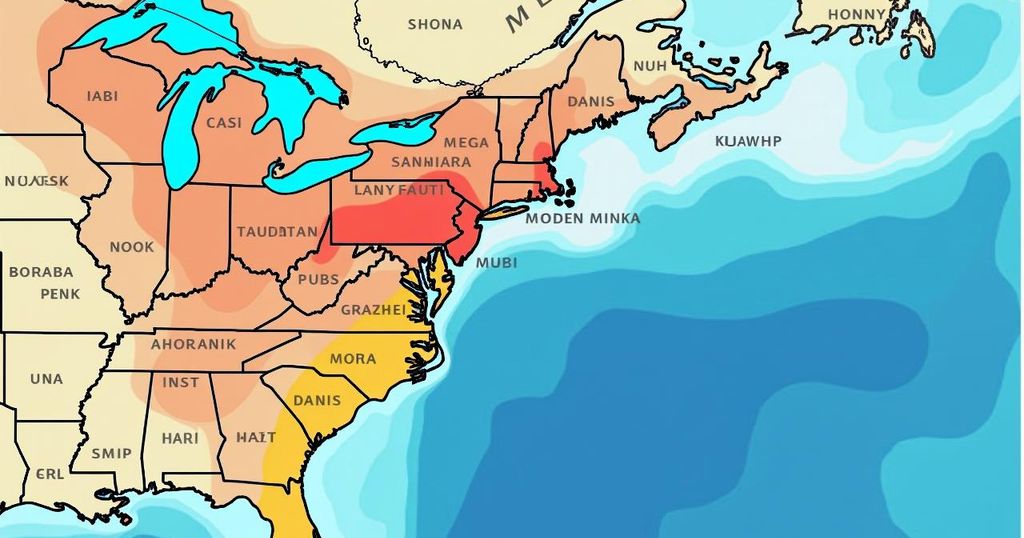Hurricane Kirk, a Category 3 storm moving towards the East Coast, may create perilous surf and rip currents in the U.S. this weekend. Although it is not expected to make landfall, significant ocean swells are forecasted to affect various regions. The storm is anticipated to intensify to a Category 4, contributing to an already active hurricane season characterized by multiple named storms and hurricanes.
Hurricane Kirk, categorized as a Category 3 storm, is advancing towards the East Coast from the Central Atlantic and poses a potential threat of “life-threatening surf and rip current conditions” across parts of the United States this upcoming weekend. The National Hurricane Center has indicated that although the hurricane is forecasted not to make landfall, it is expected to generate significant ocean swells affecting various regions. As Hurricane Kirk progresses, swells are anticipated to impact the Leeward Islands, situated east of Puerto Rico, on Friday, followed by Bermuda and the Greater Antilles on Saturday, with the east coast of the U.S. and the Bahamas being affected on Sunday. Forecasters predict that Kirk may intensify further, with wind speeds potentially escalating to 140 miles per hour by Friday afternoon, which would elevate it to a Category 4 hurricane. This storm is the 11th named storm of the current Atlantic hurricane season, occurring just one week following the landfall of Hurricane Helene on September 26th. The National Oceanic and Atmospheric Administration has issued predictions for an especially active storm season from June 1 to November 30, estimating up to 25 named storms and 13 hurricanes. Thus far, the season has witnessed the formation of seven hurricanes and five tropical storms. Additionally, as the nation braces for Kirk, the impact of Hurricane Helene remains severe. Landfalling as a Category 4 storm, Helene has led to a growing death toll, particularly in Asheville, North Carolina, where floods have caused significant destruction. Recovery efforts are currently bolstered by a directive from President Joe Biden, mobilizing up to 1,000 active-duty military personnel to assist the North Carolina National Guard in aid missions. Reports indicate that approximately one million individuals are still without power across several southeastern states.
The Atlantic hurricane season runs from June 1 to November 30, and predictions from the National Oceanic and Atmospheric Administration for the current season suggest a notably active year with expectations of 25 named storms and 13 hurricanes. Hurricane Kirk is part of this season’s pattern, marking the 11th named storm. Its approach brings to mind the recent devastation of Hurricane Helene, which made landfall in late September, emphasizing the urgent need for awareness and preparedness as storms develop in the Atlantic.
In summary, Hurricane Kirk is intensifying as it moves toward the United States, potentially causing hazardous conditions such as dangerous surf and rip currents along the East Coast. The hurricane’s forecasted path indicates significant ocean swells impacting various regions throughout the weekend. Meanwhile, the aftermath of Hurricane Helene serves as a somber reminder of the destructive potential of hurricanes, underscoring the importance of timely responses and preparedness as the storm season progresses.
Original Source: www.forbes.com






